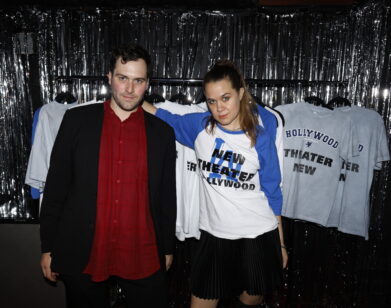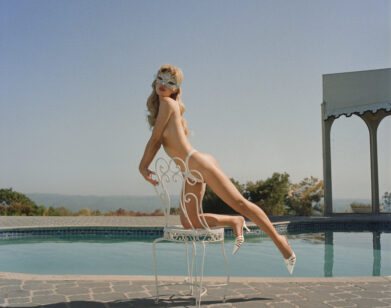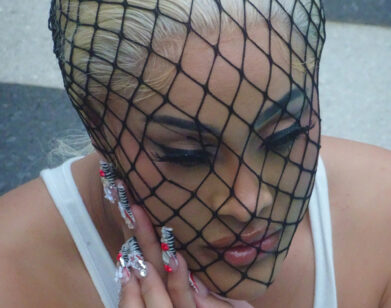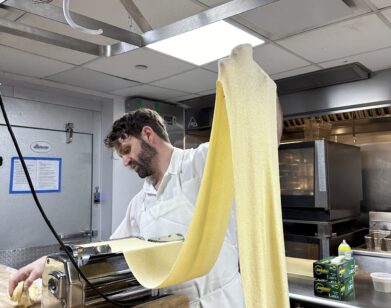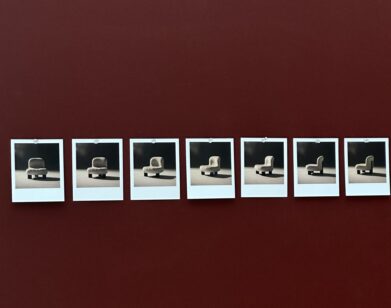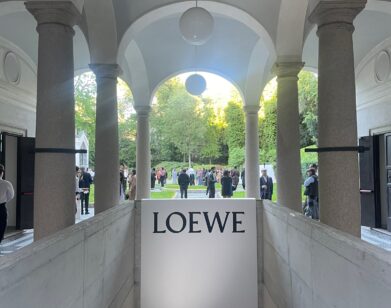Remembering Don Hill
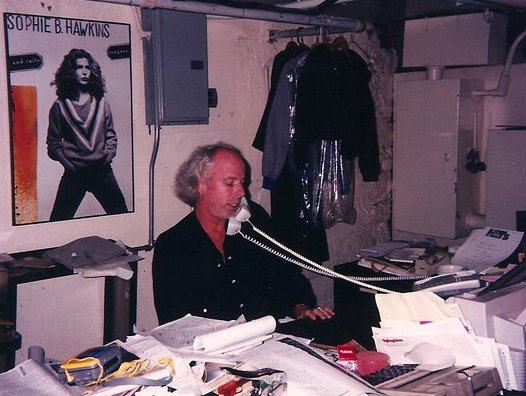
DON HILL IN MIAMI.
Donald Mulvihill was better known to generations of artists, performers, dancers, DJs and—above all—musicians as the kind and too-generous owner of Don Hill’s on Greenwich Street in Manhattan. He went to the hospital on the evening of Thursday March 31, 2011, and passed away soon after. There is no way to sum up into words what an extraordinary impact he had in the history of music. A true and singular Don Hill story might be impossible—so we’ve enlisted the help of a few dozen of his best and most trusted friends, including Bebe Buell, Michael Musto, Moby, Martin Sheridan, the MisShapes, and Nicki Camp, to help tell the story of his career in eight parts. Don Hill, you’ll be missed.
PART I: Bartending at Kenny’s Castaways; managing and booking talent at The Cat Club.
MARTIN SHERIDAN: On the opening night of Kenny’s Castaways in 1975, Pat Kenny came up to me. He says, “Do you know anything about bartending? I’m a man short.” I didn’t. But he threw me back there anyway. I don’t know a thing about bartending. I look over and there’s this skinny guy working the soundboard. I said, “Hey, do you know anything about bartending? Because I can tell from here you sure don’t know how to work the board.” And that was how I met Don Hill.
MICHAEL MUSTO: Don seemed to me like a hillbilly who had wandered into the Gotham nightlife scene by mistake—he was that unpretentious.
NICKI CAMP: If any person came to Don and said, “I’ve got this great idea for this night,” Don would say, “Sure, I’ll give you a shot.” Don would give people a shot where no one else would give them a shot.
MISS GUY: I was 17 and he was so nice to me, making sure I got right into the Cat Club. He was the first club owner to make me feel important, and that was a great thing for an insecure kid from SoCal.
THEO KOGAN: He booked Lunachicks at the Cat Club with Dee Dee Ramone, when Dee Dee made the rap album!
THOMAS ONORATO: He really was the person that gave all these people a platform and opened up the door and said, “Okay, how do you want to do it?” He would be so open and give the party time to grow.
MOBY: Don was willing to let people express themselves however they chose. He encouraged everyone, and was supportive and gracious in circumstances where lots of people would’ve been petty and mean.
MICHAEL MUSTO: And down-to-earth—a far cry from some of the NYC club owners who craved attention for themselves or had combustible personalities you never knew what to expect from.
MICHAEL SCHMIDT: He wasn’t tucked away in his office counting receipts or doing drugs like a lot of other club owners; he was always out there, very hands-on, watching the bands, mingling, having a good time. It never seemed to be about the money.
PART II: The birth of Don Hill’s.
NICKI CAMP: In 1993, Limelight came to an end, and Cat Club came to an end. Then Don Hill got hit by a car, and he was laid up in the hospital. He hated being in the hospital. He ended up in Jersey for a few weeks. He ended up getting a settlement.
DAVID CHIDEKEL: The Cat Club was shut down. Don then went back to work for Pat Kenny of Kenny’s Castaways, then a friend of his named Martin Sheridan who owned Ear Inn said that was just wrong to have Don Hill working the door.
MARTIN SHERIDAN: At first, he didn’t want his name on the door. But I said, “You’ve got to, because this is really your place.” We made up the logo ourselves off the old Dunhill’s Cigarettes ad. But then he started to really love it. He loved having people come over to his place.
MICHAEL T.: There are so many things about Cat Club that I realize I got so much out of. And in turn, Don was able to bring many of these elements into Don Hill’s. You could dance, you could see a show—bands or dancers—but it would register equally because they had a proper stage and soundsystem. It was like a little family. Same bartenders, staff, door staff, dancers, DJs, bands. You felt at home.
NICKI CAMP: Martin was on the community board, and he got them to give Don a cabaret license. Which is unheard-of, if you are not zoned for a cabaret license. The neighborhood wasn’t the way it is now. Those high rises were empty lots. It wasn’t rich socialites who gave a shit. If it was today, it would never happen. Cabaret license in a space zoned for a restaurant?
JORGE NEVES: I opened up a restaurant across from Don Hill’s two years after he started. One day we both had to go to the community board to get our liquor license, and Don came up to me and said, “If they ask you about noise, just say you have an acoustic engineer. And if they ask you what time you close, just say 10.” I had no idea what he was talking about. Sure enough, I go to the community board and they ask me if my place is loud. And then I said, “No. We have an acoustic engineer.” No idea what that even was. Then I look over at Don and I hear myself saying, “We close at 10:30.”
SARA CONCA: Don Hill had a way about him. He could bring out the best in anyone’s creative field.
BEBE BUELL: Pauley Perrette from NCIS worked as a bartender in the ’90s, and Don was her boss at The Bitter End.
AMBER STAR: He hired dancers at the Cat Club who went on to be in a Michael Jackson video.
CANDACE OLAH: Don always referred to the pole near his corner as “Lady Gaga’s pole.”
“LADY GAGA’S POLE.”
BILLY VELVET: One night we were leaving The Cat Club, and Don wanted me to meet him. So he goes, “Get in a cab with that guy.” He meant Joey Ramone.
MARTIN SHERIDAN: One day he’s working the door at The Bitter End. Bob Dylan walks in the door, and the first thing he says to Don is, “Nice boots.”
CANDACE OLAH: Those boots! Don’s ostrich boots!
MARTIN SHERIDAN: Don was an unpretentious as they come, and if he and Bob Dylan sat down, you know they’d say nothing to each other about themselves. But they would talk boots.
PART III: The genre-redefining Squeezebox party at Don Hill’s.
MICHAEL SCHMIDT: I wanted a mixed club where everyone except those with an attitude felt welcomed, and the gay and straight scenes could coexist, which did not happen much in New York City at that time. It was to be the opposite of the typical rock dives of the day, where gays were often ostracized. Straights were typically denied from gay bars as well, and we aimed to do something about that, too.
MARTIN SHERIDAN: Sometimes, I’d say, “Don, I need to go to the office but I can’t get past all the boys in the dressing room.”
CANDACE OLAH: Don used to joke that you need to be good at hopscotch to get through to his office.
MARTIN SHERIDAN: [laughs] One night I had my nephew up from London. At that time, Squeezebox was the biggest gay, drag, and whatever party in the city. So I said to these couple of young boys, “Look we could use a hand at the bar tonight. So dress up. We want you to work the door.” This must have been 1994. I got Don in on it and I told the boys, “New York City is very dangerous, and so you’ve got to search everyone who walks in here, because they might have guns.” You should have seen how pleased the Squeezebox crowd was to have a couple of nice young boys from London feel them up on the way in.
EMMA STRAUB: I remember following Joaquin Phoenix around the tiny place when he was still going out with Liv Tyler. He wore a backpack, like the rest of us, and looked so completely miserable being there. Liv always loved to dance—they would play Aerosmith songs for her.
LIV TYLER WITH BEBE BUELL AT DON HILL’S.
MICHAEL H.: If you walked into Squeezebox, you had the drag queen stage hosting, which brought in everyone under the sun. The bikers, John Waters, Debbie Harry, Macaulay Culkin.
MICHAEL SCHMIDT: I never allowed in the press, so soon the famous and the infamous came calling. Cultural influencers from Mugler to McQueen, Björk to Boy George, Joey Ramone to John Kennedy, Jr., were all hanging with the kids at Squeezebox. Stephen Sprouse brought Verushka. Hedwig and the Angry Inch and the Toilet Boys were born. Books were written, bands played, movies were made. Deborah Harry, Joan Jett, Courtney Love, Nina Hagen, Lene Lovich, Marilyn Manson, even Tura Satana and many others, all sang with the queens on the SqueezeBox stage. John Waters called it “the greatest club in America.”
PART IV: Home of the MisShapes.
LEIGH LEZARK: I snuck into Don Hill’s when I was in high school, to go to Tiswas in 2001. But I remember every different night had something great. It was always a really fun feeling. That’s where I met Greg [Krelenstein] and Geordon [Nicol].
GEORDON NICOL: Leigh, Greg, and I actually met and became friends at Don Hill’s in 2002, when we were just teenagers. Justine D. and Nick Mark had a party there on Saturday nights. We ended up starting a party called MisShapes at Luke & Leroy in 2003.
LEIGH LEZARK: Luke & Leroy’s was always trouble. In 2005, we would get The Killers or Madonna to come, and it would be mobbed, and the AC would blow out in like the middle of July. We needed to move to a place that made more sense.
NICKI CAMP: It was me and Don for five years. One day, it was dead on a Saturday at Don Hill’s and the MisShapes called Ronnie saying they were starting to outgrow Luke & Leroy’s.
GEORDON NICOL: We thought it would be funny if we could move to Don Hill’s, where we had all met each other. We did every Saturday for two and a half years.
LEIGH LEZARK: There was this basement where the office was, and when the party would just get too crowded, there was a subparty. Initially they were supposed to be green rooms for bands, but we just had wild times. Everybody wanted to get their photo taken right away, so as soon as people came in they’d check their coat and go into the photo room. Because why would you want your photo taken after you’d been sweating and drinking?
PART V: Who Don was.
BEBE BUELL: One night after a breakup, I realized I hadn’t eaten anything that day and I had too much vodka. Suddenly I realized that if I stood up off my barstool I might fall over. And you know what Don did? He found my coat downstairs and said, “Come on, I’m taking you home.” No one saw me, and he snuck me out the side door. He didn’t just shove me in a cab, he came right home with me. He boiled some water for me and made me some tea. And he even put a little pan next to my bed in case I got sick. Then he went right back to the bar and no one knew. Almost no one. The next day a friend called and said, “I heard you took Don home last night.” And Don joked, “That’s pretty good for me, how do you feel about it?”
BEBE BUELL (CENTER) AND DON HILL (LEFT).
MARTIN SHERIDAN: The thing was, you could get Don out of the city if you brought him to some more music. I had a place up in Bar Harbor, in Maine, and we went up there for a trip. That’s when Don got me DWI’d. We went out to a show, and then got dinner and drinks and more drinks. I said, “Don I’m going to move the car now and then have a friend drive us home because I can see the cops up ahead. Just don’t get in the car.” And he did.
CANDACE OLAH: As soon as it got warm, you would see him with that old-school lawn chair outside of the Ear Inn. Didn’t matter if it was 60 degrees out there. He was a sun worshipper. And he always put zinc oxide over his nose. He’d wear cutoff jeans and a wifebeater and sit in the sun.
NITE BOB: We would go down to Miami to record, and Don would be so excited to get out in the sun. I don’t know if he fell asleep or what, but I saw him four hours later and he looked like he walked through a nuclear fire.
MARTIN SHERIDAN: He was a big reader of American history. He would come out to see me in Connecticut and be content to have a visit. He loved Andrew Jackson.
CANDACE OLAH: I have a little long-coat Chihuahua named Tia, and Don loved to walk her. This rock-and-roll guy living on the Upper East Side, with a long-coat Chihuahua with a pink leash, and he would take her into a bar and go watch the Yankees game.
MARTIN SHERIDAN: I knew Don since 1975, and he and I were the only people I knew who never moved. Rent control: it’s a beautiful thing the city started supposedly to help the war veterans, but it really made a difference for the music veterans.
DAVID CHIDEKEL: For the record, I never knew how old he was. Every year for twelve years, we did “Don Hill’s 50th Birthday Party,” and even the first year I told him we were lying.
NICKI CAMP: Don was very funny about his age. It’s weird. I was told (total rumor) by a very good source that he was 72.
BRENDAN BLISS: I heard he was 66.
NICKI CAMP: What I will say is there is a person who had to do some paperwork for Don about five years ago. She needed his birth certificate, Social Security card, all that stuff. She had to get all of Don’s papers and she said, “Holy shit, did you know what year Don was born?” Now, this was back in 2004, and I didn’t see it first hand. But it would put Don at 72-73 now.
MARTIN SHERIDAN: Don was the only person I knew who never changed. You’d see him in a picture from 1975 wearing the same shirt in 2005, and you could see why, with all of his perfect dry cleaning.
NICKI CAMP: I have a Polaroid of me and Don at The Cat Club in 1989 and he looks almost exactly the same. It could have been taken last week. Same crown of long white hair. Cowboy shirt and a leather vest.
CANDACE OLAH: He probably still has that shirt. Unless it’s at the dry cleaner. He would dry clean his jeans. I would say, Don just throw them in the wash with everything else. And he always said, “I can’t.” Like Pollyanna. “I can’t.”
PART VI: The redesign.
HENRY SMULEWITZ: I sat down with Don about a year ago, so we started talking about updating the club. Don felt that it had come to a stalemate, and he wanted some new blood.
NICKI CAMP: The bottom line is that the economy went down in 2008. It was increasingly hard to bring in the right numbers. Don and I both knew that something had to change, for better or for worse. Clubs open; clubs close. His idea was to bring Nur [Khan] and Paul [Sevigny] in. I basically said I don’t think I want to continue with this, and we parted as friends.
NUR KHAN: We got even closer this year and did some really special concerts together. But man—the old days!
BEBE BUELL: I’ve known Nur for a long time. What he did at the Rose Bar was amazing. All of us were really happy when we heard he was going to take the club and keep Don’s name. That’s all been good news.
HENRY SMULEWITZ: I started working at Don Hill’s for Fashion Week. We pulled in banquettes and put in MICROS Terminals. There was no computer system there. We wanted to update it and keep the same gritty vibe. There was no accounting system. There was no safe. Don had his own system—and it worked! That was the funny thing.
JOHNNY IMPERIOLI: One day he comes across the street to Pao and I said, “Don, I heard you got those touch-screen computers in there. You know how to use them now?” And he said, “I only know how to do one thing.” What’s that? “I know how to turn it off.”
BEBE BUELL: He was happy but remorseful when the club lost its underground family. But we were all happy to see him getting the crowds again. And we especially loved how the bathrooms improved.
MARTIN SHERIDAN: His new partners had ideas about how to keep the business going and I said, “It’s Don’s name on the door.” He has the final say.
BEBE BUELL: It always made him feel really bad when people had to stand outside. He wanted everybody to be able to get in. He didn’t want it to be a snob fest. Especially when Iggy Pop played: “I feel so bad that I couldn’t get everybody in here. If someone calls tomorrow and says they couldn’t get in…”
PART VII: Don’s death.
ERIN McQUATTERS: He didn’t need to come in every day, but that place was his baby.
JORGE NEVES: That man was a true workaholic.
BEBE BUELL: A few of us can say that we owe our careers for him. Him and Hilly. We had time to prepare for Hilly because we knew he was sick. But this thing with Don was a complete shock.
ERIN McQUATTERS: Don didn’t really know how to use a computer. So the day after a big event, I would Google all the blogs and show him what came up. There was a picture of him after The Kills show. He said, “Wow. I look like shit.”
DAVID CHIDEKEL: On Monday Don and I had a meeting and he said, “I don’t feel well, I’m gonna go home.” I never heard him complain a day in his life.
MARTIN SHERIDAN: Things changed a lot in the last seven months.
NICKI CAMP: I can tell you this right now. Don was not sick seven months ago.
DAVID CHIDEKEL: On Tuesday I talked to him very early in the morning, and he said he’d call me back later. I called into the office and spoke to Erin.
ERIN McQUATTERS: I tried to get Don to go to the doctor, and he said no. My dad had been sick too. I asked him if he wanted me to get him some soup or Dayquil, and he said no.
BEBE BUELL: He was always skinny. But the last time I saw him I knew he looked really skinny. I said, “You look too skinny.” And he said, “Well, I eat like a pig!”
ERIN McQUATTERS: We didn’t expect Don to come in Wednesday. He looked really sick. He just looked like he maybe had the flu. He was really weak. My dad was sick in South Carolina, and I was leaving early that day to go visit him. I left the office around three, and I tried to get Don to leave with me and he said, “No, I want to stay here for a while.” It was just the two of us there that day. He said, “Goodbye, kid. I hope your dad is feeling better.”
DAVID CHIDEKEL: Then Don’s phone ran out of battery and his voicemail box was full. Everyone started calling around at the hospitals and we couldn’t find him.
MARTIN SHERIDAN: He only had a bank card on him, so the hospital called CitiBank seeing if there was anyone else on the account—usually a man his age turns up, and they start trying to find the wife. No one was on the account, but since we’d been business partners all these years they had my number there from before. I was on my way to Connecticut, and I get a call from the hospital saying this man has turned up and he’s very sick. So I pull over to this McDonald’s to take the call. That was 5 o’clock.
BEBE BUELL: He died at 7 o’clock, and I heard at 7:30.
PART VIII: His legacy.
DON IN HIS OFFICE.
BEBE BUELL: Whatever happens next will have to be the new breed. But nobody can replace Don. Some of the things I’m reading, I just want to scream. Everybody had a right to mourn and miss and love but I don’t want anybody thinking that have the right to take Don’s place.
MICHAEL MUSTO: Whenever I predict the future of nightlife, I’m usually wrong, and that’s what makes it interesting—it’s unpredictable.
THEO KOGAN: The club will have his name, but the place will never be the same.
MARTIN SHERIDAN: It’s the end of an era.
MICHAEL MUSTO: I’m sure rock won’t ever die as a staple on the scene. It’ll just go through a period of mourning before other people step in and try to be the new Don Hill’s.
MOBY: Sometimes it’s hyperbole to say, “It’s the end of an era.” But Don’s passing is the end of an era.
JUSTIN TRANTER: Don’s place in rock-and-roll is already legendary, but I don’t think we will even realize how legendary that place is until newest batch of NYC rock stars he gave a home to take over the world.
MARTIN SHERIDAN: You would hope for musicians that there will be another man like Don Hill. Who is going to give bands a chance like that? Someone you could talk to. Someone who will give you time to grow? Who is going to walk down Spring Street now?
MICHAEL SCHMIDT: Don really just loved the rock and the roll of it all.
THOMAS ONORATO: If it was a rockin’ party, that was all that mattered to him.
TOMMY LONDON: Don Hill will always be alive and well in the New York City rock-and-roll scene.
AMBER STAR: Don had such a passion for rock and roll
JOHNNY IMPERIOLI: Don was the heartbeat of rock and roll.
NUR KHAN: Don Hill was a rock and roll legend.
DAVID CHIDEKEL: Don loved rock and roll.
NUR KHAN: Don loved rock and roll.
MARTIN SHERIDAN: Don loved rock and roll.
MICHAEL T.: Don was rock and roll.

